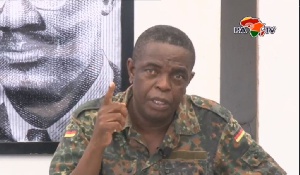Health News of Wednesday, 17 December 2014
Source: GNA
Call for debt relief for Ebola-hit countries
The International Monetary Fund (IMF) and World Bank have been urged to provide urgent debt relief to the three Ebola-hit countries – Guinea, Liberia and Sierra Leone – which are due to spend $100 million by the end of this year on external debt repayment.
In 2015 the figure is expected to rise to $130 million – of which roughly a quarter is owed to the IMF and World Bank.
The Jubilee Debt Campaign said this money was urgently needed in those countries to tackle the Ebola virus, which at the latest count has claimed more than 6,000 lives.
Two weeks ago the government of Sierra Leone made a $685,000 debt payment to the IMF and another $2 million is due this week.
Jubilee noted that the health systems in these countries were already at breaking point before this crisis.
“They can't afford to have millions of dollars flowing out of their economies now when every day counts in fighting this frightening disease,” the pressure group said in a statement urging concerned citizens worldwide to petition the Group of 20 (G20) to drop the debt.
G20 leaders meeting in Australia last month pledged to provide $300 million in “loans, debt relief and grants” for Liberia, Sierra Leone and Guinea through the IMF. But discussions are still taking place on how much of this pledge will be met with debt relief and grants, and how much with loans.
Jubilee said that the estimated total cost of the outbreak in West Africa was already $2 billion.
“Yet the IMF, which has made a $9 billion surplus from its lending over the last three years, is considering offering loans, not debt relief and grants, in response,” Jubilee said.
”If they do so, then the people of West Africa will be paying the price for Ebola for many years to come.”
Sarah-Jayne Clifton, Director of Jubilee Debt Campaign said: “There is a big difference between cancelling a debt and creating a new one. We welcome the commitment by the G20 to ensure that the IMF cancels debts as part of the response to Ebola.
“The IMF is awash with money. It can afford to meet the G20’s $300 million pledge without adding to the already significant debt burden on the countries worst affected by the crisis. Health systems in West Africa have been undermined by the weight of IMF debt and conditions in the past. Now is not the time to repeat those mistakes”, she said.
The IMF has estimated that the governments of Guinea, Liberia and Sierra Leone will be $600 million worse-off because of the impact of Ebola.
Ms Clifton continued: “Other lenders such as the World Bank also need to cancel debts in response to the Ebola outbreak. It is alarming that at the same time as health systems are at breaking point, millions of dollars continue to flood out of these countries in debt payments.”
The IMF has lent an additional $128 million to the three countries since the outbreak began, and is now considering lending more.
Campaigners are arguing for the additional financing to come in the form of debt cancellation and grants, pointing to the significant untapped IMF sources available.
These include the $150 million of unspent money in the IMF’s post-Catastrophe Debt Relief Trust, established following Haiti’s devastating 2010 earthquake, and the IMF’s $8.8 billion of profit since 2011 that is sitting unspent in its reserves.
The US has called for the debt relief to be paid for out of the post-Catastrophe Debt Relief Trust, which allows for debt relief in low-income countries if a disaster affects more than one-third of the population of the country, and destroys more than one-quarter of a country’s productive capacity, or causes damage exceeding 100 per cent of GDP.
Campaigners say it is unclear in the case of Ebola if the second of these has been met, so it may be that a new criterion needs to be adopted by the IMF Board.
“Upon meeting these criteria, a country has all debt payments coming due over the next two years cancelled,” Jubilee explained.
“In ‘exceptional’ circumstances, where a country has a high debt and perceived ongoing balance of payments problems, further cancellation of debt stock into the future can be allowed. If all the three countries get is two years of debt service relief, this will mean a total amount of debt and interest cancelled of $47 million.”
Jubilee added: “Debt cancellation is a fast and effective way of releasing money quickly for the governments of affected countries. And we know that the rich world can afford it. Now we need to create the political pressure to make it happen.”











